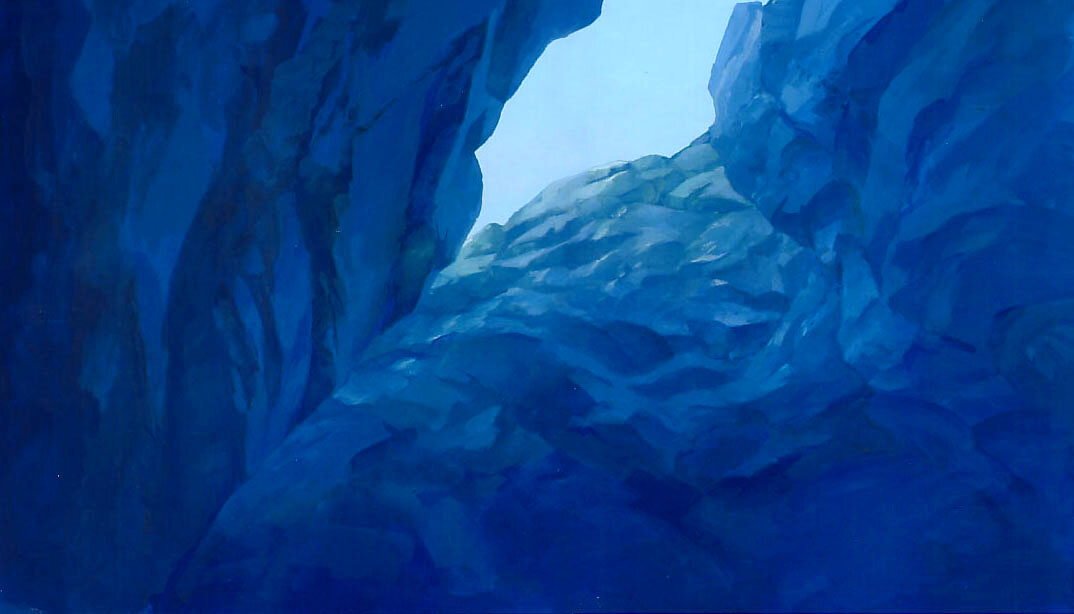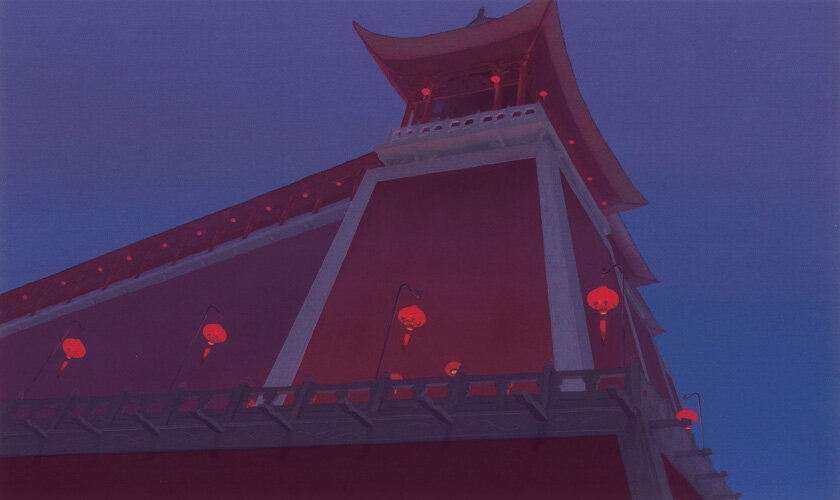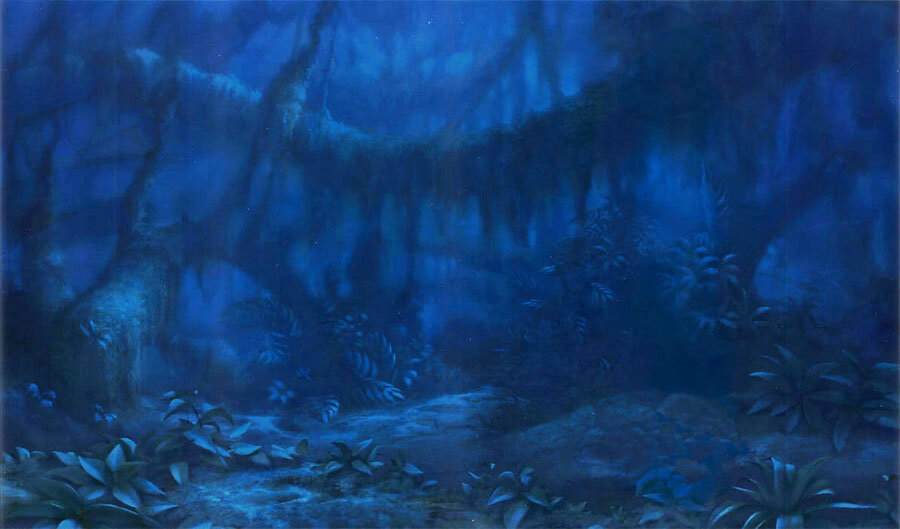Film Vault / Painted Stages Archive
Notice
Background images are property of Disney Enterprises or their respective owners, shared here for portfolio and educational purposes only. Reproduction or distribution is prohibited.
Duck Studios
Imitation of Life, 2013, watercolors
Director Mathias Poledna’s animated short, featured at the 2013 Venice Biennale’s Austrian Pavilion and the Whitney Museum’s 2016 exhibition, pays homage to 1930s cinema. Inspired by Snow White and the Seven Dwarfs, Bambi, and Pinocchio, the film captures the visual language of early Disney animation.
These examples helped set the stage for the film’s environments.
Color Key for Imitation of Life, watercolor and digital media, 2013, Geraldine Kovats
Background art for Imitation of Life, watercolor and gouache, 2013, Geraldine Kovats
Traditional Disney background art—inspired by nature and fine art—traces its lineage to Claude Lorrain’s stage-like landscapes. I held onto that connection at work; I was grateful to be working with paints and brushes and am even more honored to have contributed to a hand-crafted legacy.
Outside of work hours and during “downtime” at the studio, I painted portraits of colleagues and joined a scrappy “secret society” of artists devoted to Disney’s old standards and the tradition of studying the masters.
Walt Disney himself collaborated with leading artists of his time to create distinct visual identities for each film—a tradition that continues today. Background paintings define a film’s atmosphere, with their quality often reflecting the spirit (and budget) of the production.
Each film’s background crew, typically 10–12 artists, produced 100–150 paintings each—totaling close to 1,000 backgrounds per feature. Below are examples of my contributions, painted with traditional brushes and pigments. For a deeper dive into the creative process behind this work, I recommend Hans Bacher’s Dreamworlds.
Working on a background in Disney’s Orlando studio, from The Making of Lilo & Stitch (screenshot)
Lilo & Stitch, 2003, watercolors
In a break from Disney tradition, director Chris Sanders requested that the film’s backgrounds be painted in watercolor rather than the usual acrylics. The crew spent a year experimenting with tools and techniques, striving for a non-grainy look. This process included a workshop led by watercolor artist Thomas Schaller, whose expertise shaped our approach to applying the paint. The result was a distinctively hand-made, beautiful look. I found this project especially rewarding.
This watercolor background established the painted look of the Hawaiian vegetation. Background art for Lilo & Stitch, watercolors, 2000, Geraldine Kovats
Featured in Walt Disney World Feature Animation Exhibition, Disney’s Hollywood Studios, Geraldine Kovats, 2002
(Layout by Andy Harkness)
Walt Disney Animation Studios, The Archive Series, Layout and Background, ed. John Lasseter
I appreciate John Singer Sargent’s advice on painting with watercolors, “Make the best of an emergency”.
John Henry, 2000, scratchboard and acrylics
This film took inspiration from Harlem Renaissance artists and the Gee’s Bend quilts. Illustrator Brian Pinkney generously shared his techniques and personal process with the crew.
Brother Bear, 2003, acrylics
Background artist Xiangyuan Jie, who later became the film’s production designer, led the team in crafting the movie’s lush, painterly aesthetic. Directors Aaron Blaise and Bob Walker adjusted the aspect ratio to create a sense of “big country.”
As part of our research, the crew traveled to Jackson Hole, Wyoming, for an outdoor excursion with landscape painter Scott Christensen, followed by a color-focused oil painting workshop with Len Chmiel.
Mulan, 1998, acrylics
Production designer Hans Bacher infused the film’s backgrounds with the graceful simplicity of Chinese watercolor painting, creating a refined and unified visual style.
Acrylics on acetate, 1997, featured in Walt Disney World Feature Animation Exhibition, Disney’s Hollywood Studios, 1998
A 1998 photo of the background department, dubbed The Art Club, was taken for Mulan Reflections—a funny high-school yearbook project within the studio. Standing at the center in costume is Supervisor Bob Stanton as muse. Bob passed away in 2021, leaving a legacy. A portrait I painted of him rests beneath my hands in this photo—I now wish I had given it to him.
Tarzan, 1999, acrylics
The ambitious production of Tarzan required collaboration between Disney’s Los Angeles, Orlando, and Paris studios, assembling the largest background crew in Disney history—a total of 50 artists.
Film Vault / Books
The Walt Disney Animation Research Library
Walt Disney Animation Studios, The Archive Series, Layout & Background
2011 Disney Editions
Kiki Thorpe
Lilo & Stitch, Collected Stories from the Film’s Creators
2002 Disney Press














